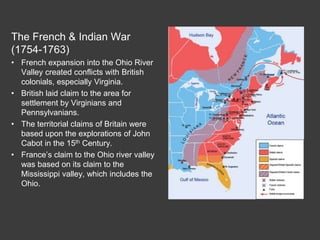The document summarizes several key events leading up to the American Revolution from 1754 to 1774. It discusses the French and Indian War and how colonial soldiers gained military experience. It then outlines several Acts passed by the British Parliament that angered the colonists, including the Sugar Act, Stamp Act, and Townshend Acts, which imposed new taxes on the colonies without representation. This led the colonists to organize groups like the Sons of Liberty and hold the Stamp Act Congress and First Continental Congress to debate rights and grievances with the British government.





























